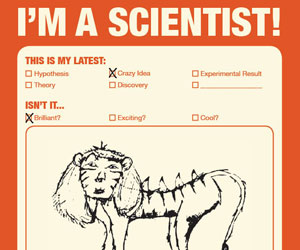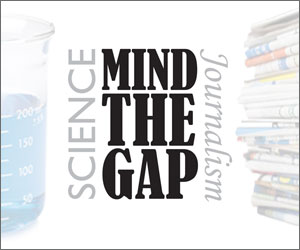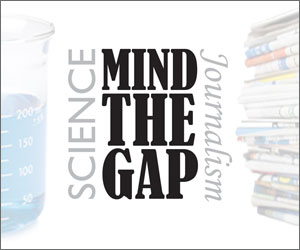 The colossal squid has the largest eyes on the planet, but it remains a mystery as to why. These soccer ball-sized eyes are almost three times the size of the second largest animal eyes (those of the sperm whale reach 109mm in diameter), and up until now they were thought to have a diameter of 250 to 400mm. However studying them has proved challenging, as these underwater giants are extremely elusive.
The colossal squid has the largest eyes on the planet, but it remains a mystery as to why. These soccer ball-sized eyes are almost three times the size of the second largest animal eyes (those of the sperm whale reach 109mm in diameter), and up until now they were thought to have a diameter of 250 to 400mm. However studying them has proved challenging, as these underwater giants are extremely elusive.
All the Better to See Sperm Whales With, My Dear.
by
The Ideal Postdoc Duration: Get Out Before You Get Old
by
 Here’s a good rule of thumb: if you can use the word “Decade” to describe your current graduate school or postdoctoral experience, it’s time to move on. In fact, our recent poll on optimizing graduate school found the ideal length to be significantly shorter than the dreaded D-word. However, grad school and postdoctoral experiences are not the same. In one situation, there are exams, committees and departments that (should) track your progress and keep you moving through the system. However, in the other situation there are far fewer administrative and departmental pressures to move on. In fact, it’s not uncommon for a postdoc to settle into a comfortable routine in which the days and weeks blend into months and years seemingly unnoticed. (Another rule of thumb: if you use the words “comfortable” and “routine” to describe your postdoc, you probably won’t be using the words “exciting new job” anytime soon.) At what point is staying in the postdoc doing more harm than good?
Here’s a good rule of thumb: if you can use the word “Decade” to describe your current graduate school or postdoctoral experience, it’s time to move on. In fact, our recent poll on optimizing graduate school found the ideal length to be significantly shorter than the dreaded D-word. However, grad school and postdoctoral experiences are not the same. In one situation, there are exams, committees and departments that (should) track your progress and keep you moving through the system. However, in the other situation there are far fewer administrative and departmental pressures to move on. In fact, it’s not uncommon for a postdoc to settle into a comfortable routine in which the days and weeks blend into months and years seemingly unnoticed. (Another rule of thumb: if you use the words “comfortable” and “routine” to describe your postdoc, you probably won’t be using the words “exciting new job” anytime soon.) At what point is staying in the postdoc doing more harm than good?
You’re a Scientist. You’ve Got Ideas. Now You’ve Got a Notepad.
by
Optimizing Graduate School: How Long is Too Long?
by
 They say a few of the defining characteristics of a “person” are the high-level thought processes of rationality, wisdom, and self-awareness. As scientists, we should be willing to turn the microscope on ourselves and our own career path to see if a rational person would deem it wise to enter a graduate school process that can take up to a decade for some folks. Are our current educational and career development pathways truly optimized for students’ benefit, or have we let other factors slowly pull our profession out of balance?
They say a few of the defining characteristics of a “person” are the high-level thought processes of rationality, wisdom, and self-awareness. As scientists, we should be willing to turn the microscope on ourselves and our own career path to see if a rational person would deem it wise to enter a graduate school process that can take up to a decade for some folks. Are our current educational and career development pathways truly optimized for students’ benefit, or have we let other factors slowly pull our profession out of balance?
Saw VII: The Revenge of the Sawfish
by
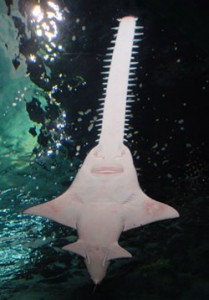 This is a sawfish. I’m pretty sure it’s named for its large, chainsaw like, nose (I know, it’s not really its nose, but I’ll get to that in a second), but I could be wrong. And until recently, what the sawfish does with its saw has been a bit of a mystery.
This is a sawfish. I’m pretty sure it’s named for its large, chainsaw like, nose (I know, it’s not really its nose, but I’ll get to that in a second), but I could be wrong. And until recently, what the sawfish does with its saw has been a bit of a mystery.
Sawfish are a species of ray, and live in both salty and fresh water in the sub-tropics. What I incorrectly referred to as its nose is actually called a rostrum, and is an extension of the fish’s cranium. It is made of cartilage, save for the boney teeth that stud the periphery. But unfortunately this rostrum, due to its propensity to get tangled in fishing nets and lines, has resulted in a dramatic decline in the number of these fish, and they are now considered critically endangered.
Stuck with a Bad Project (or Just a Bad Attitude)?
by
 Long before the Lady Gaga parody, graduate students and postdocs everywhere were painfully familiar with the term “bad project.” When we were sold the project everything sounded great- a huge impact in a hot field, and best of all it was only a couple of “straightforward” experiments away. We all know how this story ends.
Long before the Lady Gaga parody, graduate students and postdocs everywhere were painfully familiar with the term “bad project.” When we were sold the project everything sounded great- a huge impact in a hot field, and best of all it was only a couple of “straightforward” experiments away. We all know how this story ends.
How to Establish and Enforce the Chain of Command in Lab
by
I recently completed my postdoc (finally!) and took a job at a small company, who shall remain nameless. I am generally a very respectful person, both of people’s position within the company and their tenure there. However, there seems to be one employee who is technically lower than me by title, but who has been at the company for 6 years and they treat me like I’m their personal technician. I don’t want to be a jerk, but how can I make it clear that they’re supposed to do what I say, not the other way around?
Newby, Scientist I
Caution: Objects May Appear Larger Than They Really Are
by
I am terrified of cockroaches. The high-pitched-screaming, jumping-on-a-chair, shaking-in-my-boots kind of terrified. Before my department moved into the lovely facility I work in now, the labs were located in a rather dilapidated building that was infested with South American cockroaches. They usually hung out in the autoclave room, but every so often they would venture out for a joyride in the elevator. After discovering this the hard way, I exclusively took the stairs. [Continue Reading…]
From Academic Bench Chemist to Freelance Science Writer
by
 Given that finely-honed writing skills are an essential component of successful research, it should come as no surprise that many graduate students and postdocs gravitate toward science journalism as a career option. What is surprising, however, is the lack of guidance we’re given in pursuit of this goal. To see how one scientist made the transition, we spoke with Katharine Sanderson, freelance science writer and former chemist, about her unconventional path to journalism and the lessons she’s learned along the way.
Given that finely-honed writing skills are an essential component of successful research, it should come as no surprise that many graduate students and postdocs gravitate toward science journalism as a career option. What is surprising, however, is the lack of guidance we’re given in pursuit of this goal. To see how one scientist made the transition, we spoke with Katharine Sanderson, freelance science writer and former chemist, about her unconventional path to journalism and the lessons she’s learned along the way.
The Forgotten Element of Graduate School: Coursework
by
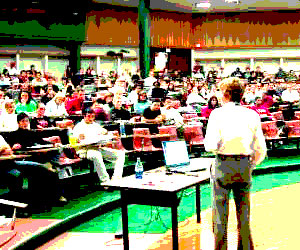 A member of my dissertation committee once remarked “Grades will keep you in graduate school but research will get you out.” The implication was that coursework is a necessary evil on the road to a Ph.D. Indeed, most of the discussions on BenchFly focus on research projects, research advisors, scoring the big paper or passing the dreaded prelim exam. However, the fact is that graduate students spend most of their first year-and-a-half or two years taking courses while they do research rotations and begin their research projects. Someone is paying for that coursework, students are spending a lot of time taking it, and faculty are spending time teaching it. So what is everyone getting for their money and time?
A member of my dissertation committee once remarked “Grades will keep you in graduate school but research will get you out.” The implication was that coursework is a necessary evil on the road to a Ph.D. Indeed, most of the discussions on BenchFly focus on research projects, research advisors, scoring the big paper or passing the dreaded prelim exam. However, the fact is that graduate students spend most of their first year-and-a-half or two years taking courses while they do research rotations and begin their research projects. Someone is paying for that coursework, students are spending a lot of time taking it, and faculty are spending time teaching it. So what is everyone getting for their money and time?

